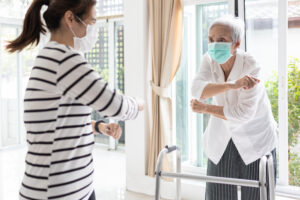
02 Nov Can Family Caregivers be Paid to Care For Loved Ones?
Learn what options exist that allow family members to get paid to provide home care to friends and loved ones, such as their parents, siblings, and even children in some cases.
A large number of Americans find themselves providing hands-on care to family or friends in the home. The vast majority of these caregivers are considered informal caregivers This simply means that they provide care to others out of love and without receiving compensation.
Caring for loved ones like family and friends
Providing care assistance to a family member or loved one can be rewarding but also challenging. For example, many caregivers have to provide assistance to others while also juggling full-time jobs or childcare.
However, there are many benefits of providing care to a family member or friend. As a caregiver, you will know more about your loved one than a hired caregiver. While there are many excellent home care aides and home health aides out there, you won’t have to worry about others that may not be as empathetic, compassionate, or attentive to your loved one’s needs.
Statistics of providing home care for loved ones
A recent AARP study showed that caregivers spend more than $7400 per year on caregiving related expenses. More than 3 out of 4 caregivers incurred some or all of the following costs personally. The costs of caregiving usually involve:
- Healthcare needs. These include things like doctors visits and medical equipment.
- Household expenses. Over 40 percent of costs were spent on household costs. These include mortgage and rent payments or other expenses related to the home.
- Personal care expenses. Clothing, personal hygiene supplies, soap and shampoo, or even pet care are incurred expenses.
- Education, travel or legal expenses. Traveling to provide care or making changes to vehicles to accommodate care recipients are some additional expenses. Lawyer’s consultations and training expenses to learn how to provide care may be further examples
- Paying for caregiving support. Some individuals also spend money on home care assistance or respite care. This happens during times when the family caregiver may be unavailable or need a break from providing care.
Family caregivers may face some financial burdens, as you can see. They may need to sacrifice some personal savings or spending money, take time off from work which may not be paid, and ultimately save less for retirement.
Follow us on social media and never miss an update!
Home care financial assistance for caregivers
There are several programs out there that allow care recipients to receive home care services from a family member. Not only are they at low or no cost, but they also provide payment to caregivers. This includes a family member, friend, or loved one.
Medicaid waiver program
The most common program that pays family and friends to provide care is a Medicaid option program known as the Medicaid Waiver. These Waivers are more commonly referred to as Home and Community Based Services (HCBS) Waivers here in Pennsylvania. They may also be known as 1915(c) Waivers or Section 1115 Waivers. Waivers like these are directed under federal guidelines. They allow and facilitate states to pay for certain support and care services like home care. Other supports and services are also available. This waiver falls under the Community HealthChoices waiver here in PA, also called CHC waiver.
Who are the Medicaid waiver services for?
These services are intended for people that reside outside of long term care facilities such as nursing homes or assisted living. In most cases, they pay for personal care at home. This is care that provides direct assistance with activities of daily living. These are activities an individual needs such as bathing, getting dressed, or grooming. It also includes household services offered for older adults or disabled individuals that live in their own homes. It may also include care received in the home of a loved one or family member.
What is the Medicaid waiver program like in Pennsylvania? Can you get paid in Pennsylvania state to care for a loved one or family member?
Yes, as long as conditions are met. The state of Pennsylvania recognizes the benefits that come with having a loved one provide home care assistance to a friend or family member. Therefore, one can be compensated to provide home care to a family or friend.
Read more of our top resources related to caregiving and the waiver program:
- Pennsylvania’s CHC Medicaid Waiver: A Guide to Services at Home
- Get Paid to Care For A Loved One in Pennsylvania: A Guide
- Pennsylvania’s Medicaid Waiver: The Step by Step Enrollment Guide
- Top Paying Home Care Agencies in Philadelphia: A Guide
- What Home Care Agencies Pay Their Employees Weekly?
How do you get started?
For starters, the care recipient (such as the senior or disabled individual) will need to qualify for the medicaid waiver program through the Office of Long Term Living (OLTL). This is the department that administers Medical Assistance programs. This is what provides long-term care support services to older Pennsylvanians or adults with disabilities. Through this program, they provide compensation to care providers such as home care agencies. The home care agencies will pay for the caregivers or home health aides, which include approved family members or friends employed through the home care agency.
What is the eligibility?
Prospective applicants must fundamentally meet two criteria.
Financial eligibility
One must have limited financial resources to be approved through the Medicaid waiver program. This is because Medicaid is intended for individuals that are low income and/or have limited financial resources.
- For the state of Pennsylvania, as a general rule of thumb, seniors must have income no greater than 300% of the Federal Benefit Rate (FBR).
- As of 2020, this means a single individual cannot have income in excess of $2,349 / month.
- The asset limit for a single person is $8,000 after allowances (including savings accounts and investments). In addition, certain exemptions are allowed, such as one’s home that they reside in or intend to return to, and it is valued under $585,000, along with household items, and personal effects.
Clinical eligibility
Additional criteria is meeting functional eligibility requirements to qualify for the services. There is a clinical component, which means someone has to be considered “Nursing Facility Clinical Eligible.” Basically, it means that the person qualifying for care requires care to the level of assistance of a nursing home.
- This is done through the state of Pennsylvania with an assessment called a Level of Care Determination
- The individual must have an illness, injury, disability, or medical condition diagnosed by a physician
- The patient’s physician must certify that the individual meets this criteria
- The level of care must surpass that of just room and board in a nursing home. Basically, the condition, injury, illness, or condition would require a significant amount of hands on care and support from a healthcare team
The following is a list of criteria that the state considers when determining clinical eligibility:
- The individual has a diagnosis that requires treatment. The individual’s diagnosis and treatment impact his/her physical and/or psychological ability to manage their own care.
- The individual’s ability affects managing their care, treatments, and interventions.
- If the individual has a diagnosis of Alzheimer’s disease, dementia, traumatic brain injury, or other mental health diagnosis, the Level of Care is based on the degree to which psychological problems are affecting the individual’s functioning and the ability of that individual to maintain himself or herself in their environment.
- Deficits in Activities of Daily Living (ADLs) alone will not meet the criteria for NFCE. ADLs include things like bathing, dressing, grooming, and cooking. The individual must have a medical condition that is “currently being treated.” The condition must create a medical need that requires care and services of a healthcare professional.
Next steps if program approval is granted
Once the participant is approved by the state waiver program, they will be assessed to determine what services may be available under the Medicaid waiver. They will then be approved for their own set of services, depending on what their individual needs are. We detail the list of services available here.
Home care services and agencies available
Because of the nature of their needs, most individuals will qualify for some level of home care services. At this point, the care recipient can then choose a home care agency that allows the employment of eligible friends, family members, or loved ones. It is important to find an agency that is reputable, offers comprehensive training, as well as support to both caregivers and to the recipients of care.
With the right home care agency support, caregivers can make sure they can provide high-quality care to their loved ones. Then, the care recipients can thrive and live as independently as possible, and caregivers have the tools and resources to be successful. Chosen Family Home Care offers many training, development, and mentorship opportunities for caregivers and is proud to employ eligible family and friends as caregivers as part of our team.
What about Medicare? Do they pay for caregivers that provide home care support?
Medicare is very distinct from both Medicaid and the Medicaid waiver program we discuss here. It is a government health insurance coverage plan for older adults age 65 and older. Medicare will not pay for long-term care services, like in-home care support and adult day services. This is true if home care services are provided by a hired third-party caregiver or a friend/family member. Basically, non-medical home care that provides hands on assistance is a very limited benefit of Medicare.
Medicare options for home care
In certain cases, caregiving families may receive financial relief under Medicare. These include respite care or to buy certain goods and services, and can sometimes pay for caregiving. As a general rule, Medicare cannot be counted on for long term care services such as home care, but may provide short term options in limited cases. Review your Medicare policy and talk to a Medicare specialist for more information.
Are there restrictions on which family members or other individuals can and cannot provide home care services?
Yes. A spouse or legal guardian cannot provide home care services as a caregiver and be paid for them under the Medicaid waiver program. Spouses and/or legal guardians can only provide informal support, i.e. unpaid support.
Plus, Medicaid waiver restrictions do not allow individuals that hold power of attorney (POA) over the recipient of care to be compensated caregivers as well.
Examples of individuals that may be eligible to provide compensated home care might include:
- Siblings, like brothers and sisters
- Friends
- Unmarried domestic partners
- Relatives like aunts, uncles, cousins, nieces, nephews
- Children, such as sons and daughters
- Grandchildren
- Parents to children, as long as those children are adults and qualify under the program
- Private caregivers identified by the family or care recipient
How much does Medicaid pay caregivers to provide home care?
The Medicaid waiver has fixed reimbursement rates that they pay home care agencies for home care services rendered. The home care agency, in turn, will then provide caregivers, including family members, payment as a result. Generally, these individuals will be hired as direct employees of home care agencies. They will be paid on an hourly basis, in most cases. Because they are employees, they will also be eligible for other benefits offered, such as vacation pay, sick pay, a retirement plan, etc. Caregiver pay is shaped and limited by the reimbursement that the state and managed care plans through Community HealthChoices pay to home care agencies and other providers of care.
Salary surveys show that caregivers get paid an average between $10 and $14 per hour of non-medical home care services provided here in Philadelphia, Pennsylvania. Only Chosen Family Home Care is the top paying home care agency in Philadelphia. We pay all family caregivers an average of $13.75 per hour. Chosen Family Home Care is upfront and transparent about what we offer.
Are all home care agencies the same?
Home care agencies vary widely between the level of training, support, and pay they provide to their employees and caregivers. While each organization has the same fixed Medicaid waiver payments received, their pay and benefits packages will all be different. As a result, it is important to consider that when evaluating home care providers. Also, it’s vital to consider additional benefits or perks like ongoing training opportunities, company culture, and other perks specific to each organization.
For example, Chosen Family Home Care has a comprehensive package for caregivers and is one of the highest paying local Philadelphia home care agencies. Chosen Family will even match or beat pay from any local home care agency. In addition, company culture is a major focus of the organization along with work-life balance and flexibility. Chosen Family Home Care believes that stronger support and pay for caregivers leads to happier clients and ultimately better patient care and health outcomes for the recipients of care. Check out the careers section to learn more.
Do caregivers have to meet the same income or financial requirements as the care recipients?
No. Caregivers just have to meet the employment qualifications that any other private caregiver would need to meet. This includes successfully completing a background check and a negative tuberculosis screening to be hired. Any selected caregiver would never be screened for income requirements.
How can I start the process of getting me or my loved one set up?
Do you still have questions? We can help with additional inquiries. Let’s start by walking you through the Medicaid and waiver application process, understanding and determining if your loved one needs help or if they might qualify, or helping to choose a home care provider. Write, text, or give us a call and we can provide support. There is no hassle, no obligation, and satisfaction guaranteed.
Read more of our insights and follow us on Instagram and Facebook for free resources and tips to improve the health and quality of life for your loved one and for caregiver resources.









2 Comments